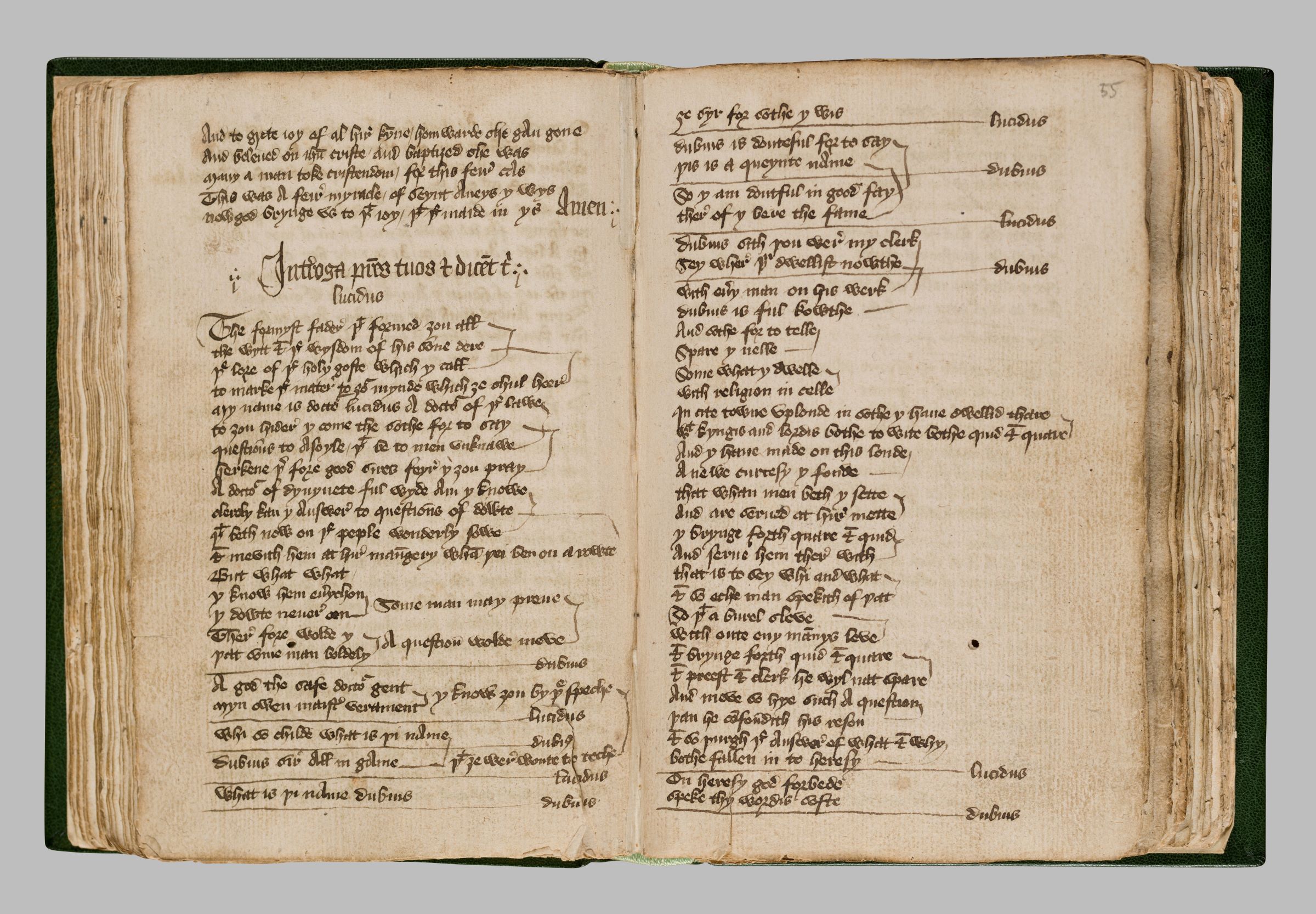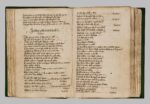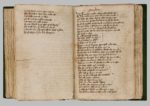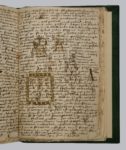
Dramatic and Theological Miscellany, 15th century [MS33]
England
Manuscript on paper, ff. 122, bound in 20th-century green morocco over pasteboard by Richard Harsher, 1978 (20.7 x 14.2 cm)
The manuscript contains a miscellany of texts including two unique Middle English dramatic dialogues, and theological texts such as the Gospel of Nicodemus and The Charter of the Abbey of the Holy Ghost.
Nine English morality plays written before 1500 survive, two of which exist only in this manuscript and are known as the ‘Winchester Dialogues’. The author of each is unknown, though there is evidence that the dialogues were written in the East Midlands. Lucidus and Dubius is a dramatic dialogue adapted from the Euclidarium, a late 11th-century Latin theological dialogue between a pupil and a teacher. It reads like a sermon in question-and-answer form. For example, Dubius asks:
how longe was Licifer in heven?
and
was Crist lryde in his tombe al naked?
The other dialogue is Occupation and Idelness, in which the witty character of Idelness rejects the religious teaching of Occupation and Doctrine. Beyond the question-and-answer format of Lucidus and Dubius, this play is more narrative driven and has a more satisfying conclusion. Idelness is eventually punished by being beaten with a birch, causing him to repent and convert.
Bound at the end of the manuscript are several pages from a 16th-century copy of Erasmus of Rotterdam’s De ratione conscribendi epistolas. Underneath a section of this text (on fol. 111r) is a drawing of the five wounds of Christ inside a square drawn in brown ink. Above is a dove of the Holy Spirit and the busts of a haloed figure (probably Christ) and a king. Besides the square is a drawing of a figure with a sword in black ink, seemingly by the same hand.
Literature: Edward Bernard, Catalogi librorum manuscriptorum Angliae et Hiberniae in unum collecti, Vol. 2 (Oxford, 1697), p. 31, nos 1347 and 1358; Neil R. Ker and Alan J. Piper, Medieval Manuscripts in British Libraries, Volume IV: Paisley–York (Oxford, 1969), pp. 623–25; Norman Davis, ‘Two Unprinted Dialogues in Late Middle English and Their Language’, Revue des Langues Vivants, vol. 35 (1969), pp. 461–72; Manfred Görlach, The Textual Tradition of the South English Legendary (Leeds, 1974), pp. 105–05; Brian S. Lee, ‘Lucidius and Dubius: A Fifteenth-Century Theological Debate and Its Sources’, Medium Aevum, vol. 45 (1976), pp. 79–96; Kathleen H. Power, ‘A Newly Identified Prose Version of the Trevisa Version of the Gospel of Nicodemus’, Notes and Queries, no. 223 (1978), pp. 5–7; Norman Davis (ed.), Non-cycle plays and The Winchester Dialogues. Facsimiles of plays and fragments in various manuscripts and the Dialogues in Winchester College MS33. With introduction and a transcript of the Dialogues by Norman Davis (Leeds, 1979); Thomas R. Liszka, ‘The First “A” Redaction of the “South English Legendary”: Information from the “Prologue”,’ Modern Philology 82.4 (1985), pp. 407–13, 409, n. 12; David C. Fowler, ‘The Middle English Gospel of Nicodemus in Winchester MS 33’, Leeds Studies in English, vol. 19 (1988), pp.67–83; David C. Fowler, The Life and Times of John Trevisa, Medieval Scholar (Seattle & London, 1995), p. 129; Ralph Hanna III, ‘Miscellaneity and Vernacularity: Conditions of Literary Production in Late Medieval England,’ in The Whole Book: Cultural Perspectives on the Medieval Miscellany, ed. by Stephen G. Nichols and Siegfried Wenzel (Michigan, 1996), pp. 37–52, p. 38; Sam Baddeley, ‘The Winchester Dialogues, 15th century’, in Richard Foster (ed.), Fifty Treasures from Winchester College (London, 2019), pp. 62–63.
Provenance: Annotations suggest the manuscript may have belonged to Winchester College by c. 1539; first listed in the 1634 catalogue of the Fellows’ Library.
Location: Fellows’ Library


